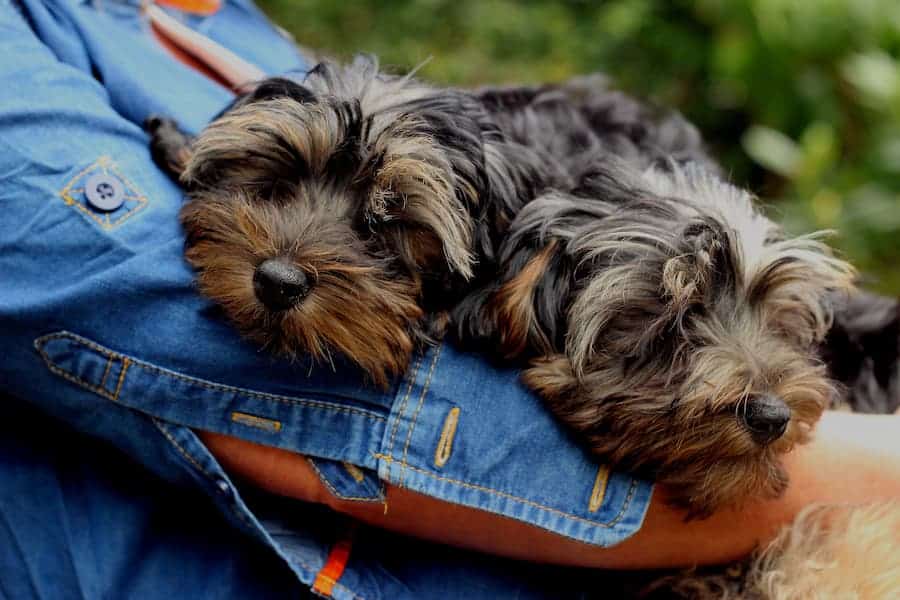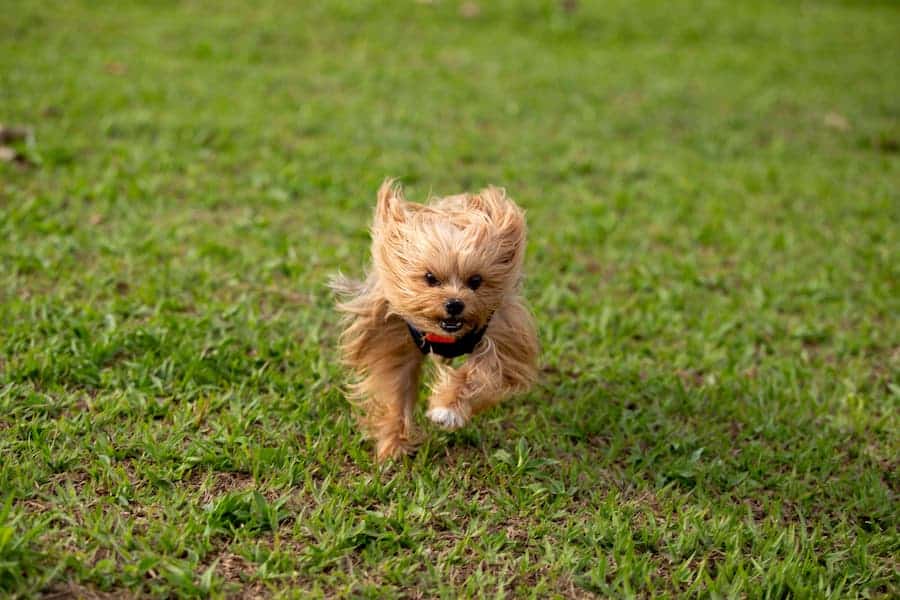When you start talking about one of the most popular dog breeds, Yorkshire is one of them, and its popularity seems not to decrease. The Yorkshire is a cute and tiny-looking dog with an energetic and brave personality. However, you may be wanting to know when is a Yorkshire Terrier fully grown?
Quick Navigation
When Is a Yorkshire Terrier Fully Grown?
A Yorkshire Terrier is considered a fully grown adult at one year. Most of them will have a slow growth rate between nine to ten months yet they usually finish growing entirely at 12 months. In a year, it should weigh 6.6 to 7.5 lbs; however, some may weigh even 8.8 lbs.

Every dog owner wants an energetic dog, so you should be careful about obesity in your dog. Your dog may become lazy, and also it may bring health issues to your dog.
Yorkshires Growth Stages
Like many smaller breed dogs, Yorkshires tend to mature faster than the larger dogs. You shouldn’t compare them to the larger breeds. In case you do, you will notice your dog will have a few stages of growth.
Birth to 7 Weeks
After they are born, your Yorkie is a newborn. They have rapid growth at this time, and they are likely going to double in size in a few days. Born without hearing and closed eyes, by three weeks of age, they can hear well, open their eyes, and learn how to walk.
Eight Weeks Yorkie
Your Yorkie is ready to be weaned from the mother at this stage. At eight weeks it’s the best time to adopt a Yorkie since it will be ready for a new home, it has started weaning and is able to socialize. At two months (8 weeks), your dog should be eating puppy kibble by free-feeding them.
Your dog is growing fast and needs all the calories it can get. Your pup will start barking and yelping at this age, letting you know they are learning how to communicate with you and that they need something.
They should get their first vaccine shots of duster and parvo at this stage.
12 Weeks Yorkie
It would be best if you stopped free-feeding your Yorkie at three months and started portion controlling their meals three times a day. It would help if you fed them a half or a quarter cup of food per day to avoid over or underfeeding them.
Your Yorkie should have another shot of distemper shots and parvo at this age and have a complete checkup.
You can start house training them and teaching them leash walking at twelve weeks.
Six Months Yorkie
At six months, the fur color of your Yorkie is its final color. If your Yorkie has added some weight, you should feed them two meals per day. You should pay attention to your dog’s bite as it isn’t uncommon for their jaws to abruptly become misaligned.

Your dog should have a rabies vaccine at this stage. Your Yorkie is old enough to start learning advanced obedience techniques at this age. At six months, your dog is at the sexual maturity stage, and if you don’t want to breed them, you should have them spayed or neutered.
12 months (1 Year) Yorkie
When they reach 1 year old, your Yorkie is an adult, and its food changes to adult food from puppy food. You can continue feeding them half or a quarter cup of food two meals a day unless advised otherwise by the vet.
Your dog needs the following boosters;
- Rabies
- DHPP
- Bordetella
- Lyme disease
- Coronavirus
- Leptospirosis
Your dog should also be on heartworm pill and flea and tick medication. You can put your dog through long grooming sessions and advanced training classes. At one to 4 years, they are young adults or junior adults, and at eight years, they become adults or senior dogs.
Factors That Can Affect Growth of Your Yorkshire Terrier
Several features can affect when your Yorkie will stop growing and how big it can get.
Genetics
Just like humans, genetics plays a vital role in your dog’s growth. Genetics affect your dog’s growth; differently, some genes tend to be stronger than others. Your dog will take the traits of both of his parents.
However at times, one of the parent’s genes will have a bigger effect on your pup than the other.
If you got your dog from a breeder is important to get information about the parents.
Diet
Your dog food can determine how huge your dog can get, furthermore some ingredients in your dog food can also change your dog’s bone growth. Your dog’s food should contain high proteins, especially when young for development. High-quality protein foods should contain muscle-building amino acids.
Your Yorkie will develop into a healthy dog with strong muscles, beautiful hair, and strong bones with the proper diet. Yorkies’ diet may make them grow too much. That’s why it’s important to feed them the right amount of food to avoid obesity.
If your Yorkie is overweight when it’s young, its growth may be affected. Their bones could shrink due to an increase in body weight.
Medical Conditions
If you notice that your Yorkies height increases after four years, it could be suffering from acromegaly. If your dog has acromegaly, then they have a pituitary gland problem. The pituitary gland releases many growth hormones, making your Yorkie grow beyond its healthy size.
A veterinarian will be able to create a treatment plan for your Yorkie so that it can stay healthy.

Related Questions
How Can You Tell How Big a Yorkie Will Get?
You take your Yorkie’s weight at three months old, double it, and add half a pound. In formula form:(your puppy’s weight at three months x 2) +0.5 lbs = your estimated Yorkies size in-lbs.
How Big Is a Full-Grown Yorkshire Terrier?
A mature Yorkie, gets to 8-9 inches tall at the shoulder and not more than 7 lbs. They have variable sizes also, whereby you can get some weighing less than 4 pounds and others growing to 15 pounds.
At What Age Do Yorkies Change Color?
For a Yorkie’s hair, its color changes at six months. At 1 to 2 years, your Yorkie’s hair will be in place since the hair color change is a gradual process.
Conclusion
Yorkshire Terriers are great dogs, and having them as puppies is always fun. They grow so fast, making their puppy time fade quickly, and they stop growing at early ages. You shouldn’t be worried because of their fast growth, relax and enjoy watching your dog grow.
